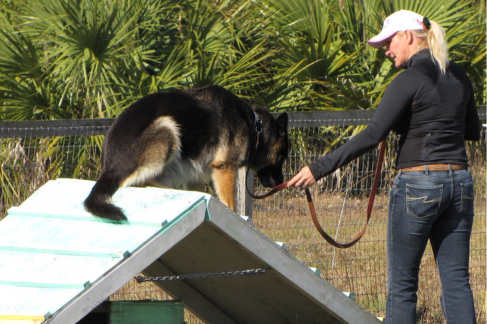In the realm of dog training, positive reinforcement stands out as a cornerstone methodology. This approach emphasizes rewarding desired behaviours rather than punishing unwanted ones, creating a harmonious and effective training environment.
Private lessons of dog training, in particular, offer a unique setting where positive reinforcement can be tailored to address the specific needs and challenges of individual dogs and their owners. In this article, we’ll delve into the significance of positive reinforcement in private dog training sessions, exploring its principles, benefits, and practical applications.
Understanding Positive Reinforcement
Positive reinforcement operates on the principle of associating rewards with desired behaviours. When a dog exhibits a behaviour that is desired by the trainer or owner, such as sitting on command or walking calmly on a leash, they receive a reward, typically in the form of treats, praise, or toys. Over time, the dog learns to repeat these behaviours to receive a positive outcome, strengthening the desired behaviour through repetition and reinforcement.
Tailored Approach in Private Sessions
Private dog training sessions offer a personalized approach that allows trainers to tailor their methods to the specific needs and characteristics of each dog. Unlike group classes, where a one-size-fits-all approach may be employed, private sessions provide the flexibility to address individual challenges, such as behavioural issues or specific commands.
Positive reinforcement can be especially effective in private sessions because it allows trainers to focus on reinforcing behaviours that are most relevant to the dog’s training goals and the owner’s preferences. Whether it’s teaching basic obedience commands, addressing fear or aggression issues, or refining advanced skills, positive reinforcement can be adapted to suit the unique requirements of each dog and their owner.
Building Trust and Confidence
One of the key advantages of positive reinforcement in private dog training sessions is its ability to build trust and confidence between the dog and their owner. By using rewards to motivate and reinforce desired behaviours, owners can create a positive training experience that strengthens the bond between them and their canine companions.
Unlike punitive methods that can erode trust and cause anxiety or fear in dogs, positive reinforcement fosters a supportive and nurturing environment where dogs feel safe to learn and explore. This positive association with training not only enhances the dog’s willingness to participate but also promotes a deeper sense of trust and respect between the dog and their owner.
Effective Problem Solving
Online dog training classes also offer an ideal platform for addressing behavioural issues and challenges in a constructive manner. Whether it’s overcoming fear or reactivity towards other dogs, addressing separation anxiety, or curbing destructive behaviours, positive reinforcement provides a non-confrontational approach to problem-solving.
Rather than focusing on punishing unwanted behaviours, positive reinforcement focuses on teaching alternative behaviours and rewarding the desired responses. This proactive approach not only addresses the root cause of the problem but also empowers owners to effectively manage and modify their dog’s behaviour in real-world situations.
Long-Term Behaviour Modification
Positive reinforcement is not just about achieving short-term results but also about fostering long-term behaviour modification. In private dog training sessions, trainers work with owners to develop training plans and strategies that promote consistency and sustainability in the dog’s behaviour.
By incorporating positive reinforcement techniques into daily routines and interactions, owners can reinforce good behaviour and gradually phase out the need for continuous rewards. Over time, the desired behaviours become ingrained habits, leading to lasting changes in the dog’s behaviour and overall demeanour.
Conclusion
Positive reinforcement plays a crucial role in private dog training sessions, offering a tailored and effective approach to behaviour modification and skill development. By emphasizing rewards and encouragement, trainers can create a positive learning environment that fosters trust, confidence, and cooperation between dogs and their owners. Whether addressing behavioural challenges or refining obedience skills, positive reinforcement paves the way for a harmonious and fulfilling relationship between dogs and their human companions.

